Love chilli? You might be a thrill-seeker – with a lower risk of heart disease
Advertisement
Health
Love chilli? You might be a thrill-seeker – with a lower chance of eye disease
The wellness pros and cons of enjoying the hot stuff similar mala hotpot and chilli padi – and what to do if you're the type of person who tin can't handle the heat.
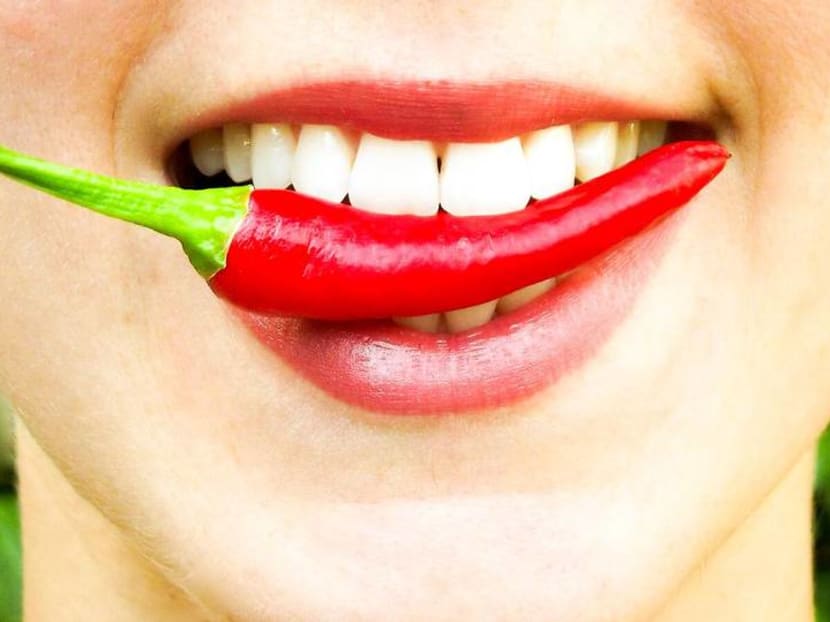
(Photo: Pixabay/englishlikeanative)
23 Mar 2022 06:03AM (Updated: 15 Aug 2022 11:44AM)
It starts with a tingling sensation on the tongue. Then, it builds. And builds. And builds.
Until it feels similar your lips and entire mouth are on fire. The rest of your body registers the "attack" past switching on the waterworks, and you're soon tearing and perspiring – and blabbering for water.
For all that "hurting", is it worth the while? If you lot need to convince your friends to "suffer" with you over mala hotpot, sambal stingray, assam pedas or spicy buffalo wings, here'due south i: Spicy food might assistance you to lose weight.
"Last year, researchers at the University Of Wyoming suggested that spicy nutrient speeds up your metabolism, allowing you lot to fire calories faster," said Dr Gan Heng Hui, Senior Specialist in Food Chemistry And Safety at Nanyang Polytechnic'due south School of Chemical and Life Sciences.
"There's too a pop – admitting untested – theory that because hot dishes are more difficult to wolf downwards, you lot're less likely to eat also much," she added.
But spicy dishes are often high in fat or paired with beers, which "will certainly take a negative effect on any potential weight loss advantages", said Dr Gan.
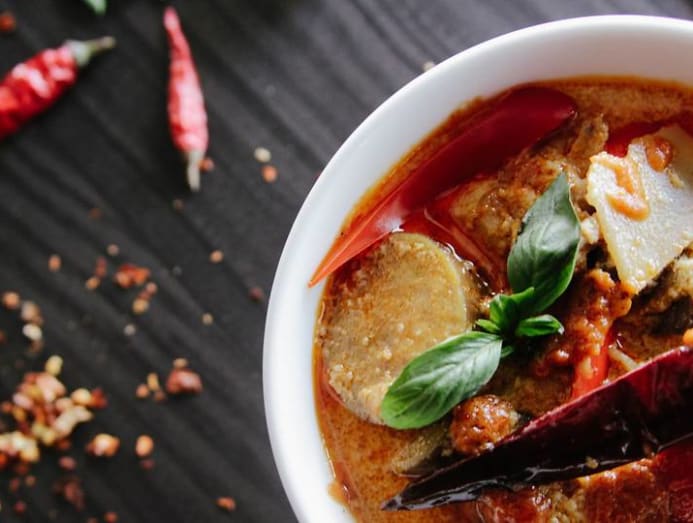
Chilli may also have other health-boosting benefits. A written report by the University of Vermont on 16,000 men published in 2022 plant a 13 per cent lower hazard of decease among chilli lovers.
Co-author of the study Dr Benjamin Litternberg explained that capsaicin seemed to reduce the amount of inflammation in the body.
"The types of deaths that were lowest in the pepper group were deaths due to vascular disease, middle attacks and stroke," he said.
Chillies are also a skillful source of nutrients such equally Vitamins A and C, as well every bit iron and potassium.
For instance, 42g of chilli can account for your recommended daily allowance of Vitamin C, although that would be an extremely spicy meal!
Other benefits on capsaicin's listing includes its purported anti-cancer property when combined with ginger.
Research shows that the burn agent and 6-ginerol, a compound found in ginger, may inhibit tumour growth, according to a study published in the Periodical Of Agricultural And Food Chemical science.
"There are a lot of reports that say that capsaicin may be good for homo health, especially with cancer," said Professor Dong Zigang at the Hormel Institute of the University of Minnesota.
"However, there are other reports that bear witness totally the contrary issue."
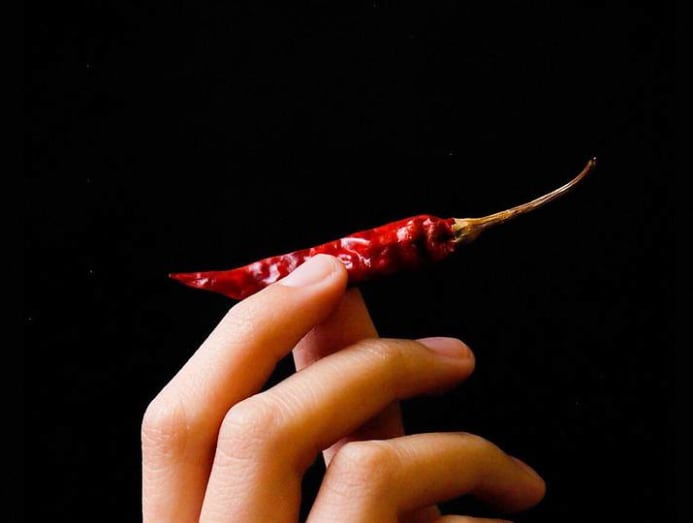
Prof Dong co-authored the review The Two Faces Of Capsaicin in the Cancer Enquiry journal and is familiar with the flipside of the chemical.
"Probably it is harmful in the breadbasket or oesophagus because capsaicin itself can cause inflammation," he said.
"And if anything can cause inflammation or and then-chosen burning effect, it must cause some prison cell deaths and therefore, the long-term chronic inflammation is maybe harmful."
READ: Mala addicts unite: Jubilant the pleasance and pain of fiery masochism
For the same reason that is inflammation, Tan advised individuals who suffer from Gastroesophageal Reflux Disease (GERD) to avoid spicy foods as information technology may irritate the stomach and cause discomfort.
WHEN SPICE IS ADDICTIVE
It is not an exaggeration to say that the furnishings of eating spicy food are akin to the desperation felt when you're physically on burn down.
"Technically, information technology is a pain indicate sent by the nerves that transmit touch and temperature sensations," said Dr Gan.
"These sensations tin be aroused from anywhere on the skin too as the mucous membranes of the nose, mouth and eyes," she said.
READ: Is the heat getting to you? Eating spicy food cools you lot downward better than ice cream
Interestingly, spiciness is non a flavour, unlike sugariness, sour, salty, biting and umami that are detected more than acutely on certain parts of the natural language, according to Associate Professor Lim Tit Meng, Master Executive of Science Eye Singapore.
"No office of the tongue is spared from the heat of the chilli," he said.
That might spell good news for kimchi ramyeon lovers, who derive a kick from the all-over tongue burn.
"Our body's natural response is to produce chemicals such every bit endorphin and dopamine," said Charlotte Tan, Dietitian from Changi General Hospital'south Dietetic And Food Services.
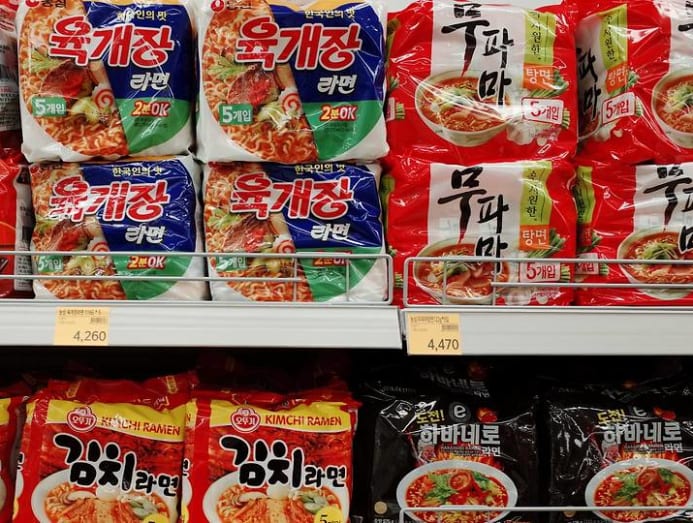
"Endorphin works to block the nerve endings from transmitting more pain signals, while dopamine produces a sensation of pleasance."
In essence, eating spicy food triggers a sense of euphoria similar to a runner's high in some people.
That love for fiery food may too translate into a honey for excitement.
When experts from Penn State University studied the relationship between personality traits and a liking for spicy food, they constitute that "sensation seekers" – those who enjoyed the thrills of roller coaster rides and gambling – were more than likely to enquire for chilli padi at mealtime.

HOT STUFF
Not everything that is spicy contains capsaicin. Hither's a look at how each of these heat agents evangelize its kicking to create varying degrees of excitement in the mouth.
Sichuan peppercorn: Mala xiang guo fans would be familiar with the effect from Sichuan peppercorns that's different from chilli's.
The departure lies in the peppercorn'south hydroxy-alpha sanshool, which gives a "tingly, numbing influence" as opposed to capsaicin's burning sensation, said Assoc Prof Lim.
The chemic as well acts on different sensors in the lips and mouth to create the tingling sensation, which co-ordinate to a University College London report, was constitute to match vibrations created at 50 Hertz.
That's what's causing your lips to get numb for a few minutes.
The burn is probably from the combination of chilli peppers, chilli powder and various other spices that are usually used with Sichuan peppercorns in mala hotpots or such dishes.
Wasabi: The stuff in wasabi that clears up your sinuses and makes your eyes h2o is allyl isothiocyanate.
It is a smaller chemical than capsaicin and that's why information technology is able to vaporise and waft up your nose, where it meets the TRPA1 receptors and gives y'all that addictive wasabi brain rush.
In fact, the smell of wasabi has been shown to exist so effective at waking people up, a Japanese visitor has developed a smoke alarm for the deaf that sprays allyl isothiocyanate when a fire is detected.
Kimchi: The heat from this pop Korean fermented dish comes primarily from gochu, a Korean red pepper used to preserve vegetables such as Chinese cabbage and radish.
Although this pepper is different from the reddish peppers of Primal American countries such as Mexico and Colombia, as well as Indonesia, India, and Thailand, it withal contains capsaicin.
This compound is one of the agents that suppresses the growth of bacteria that promotes decomposition while encouraging the growth of benign ones such every bit lactobacillus.
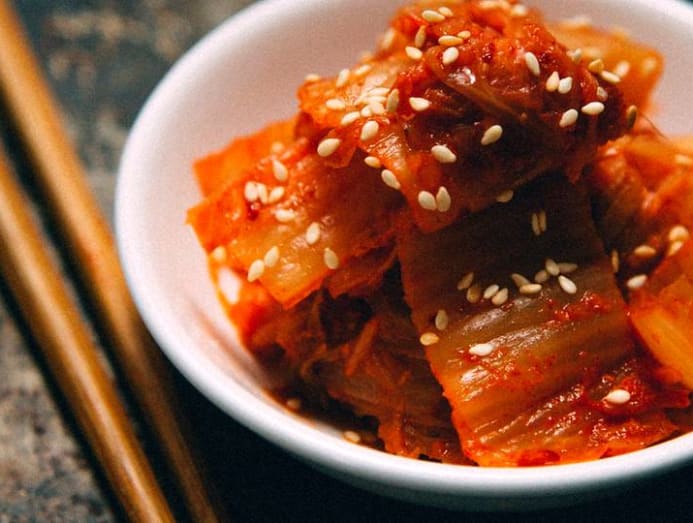
OVERCOMING THE Burn down
Equally to why many Asians seem to handle spicy food well, chilli was, and still is, a means of preserving food, thanks to its anti-microbial properties.
In studies by researchers from Cornell Academy, chilli was found to be more commonly used in countries near the equator.
Over time, people living in such climates developed a gustation for chilli, which "probably saved them a lot of death", said pb researcher Joshua Tewksbury.
Merely if that's the example, why can't you breadbasket even MacDonald'south garlic chilli sauce, while your friend alternates mouthfuls of food with chilli padi?
You may simply be "born with pain receptors that are more sensitive to capsaicin'southward sting", said Dr Gan, although she qualified that no thorough inquiry exists on the subject every bit yet.
But that's no reason why you can't be a chilli head; you lot tin "train" yourself to exist more tolerant towards spicy food.
"Capsaicin desensitisation is the phenomenon where people feel less of the burning sensation later on eating a lot of spicy food," said Tan.
"Repeated exposure to capsaicin causes the receptor doors to close and halts the transmission of hurting signals."
For example, Dr Gan said that Mexican parents give children packets of saccharide with red chilli powder to build up their spice tolerance.
"This causes the nerve endings in the mouth to dice off, therefore allowing a high tolerance to spicy foods."
In the concurrently, stand by a glass of milk or a tub of yogurt to douse the chilli-induced pain.
Dairy nutrient contains casein that binds readily to capsaicin and washes it away when you lot swallow.
"Other foods that may help with relieving the fire are bread and rice as they may absorb some of the capsaicin oil," said Tan.
Alcohol is another remedy as booze dissolves capsaicin oil, simply the proportion of booze in drinks is ordinarily too depression to exist effective, she said.
Or try biting on a slice of lemon or eating a spoonful of peanut butter, suggested Assoc Prof Lim equally acidic and oily food may also lessen the burn down.
Contempo Searches
Trending Topics
Source: https://cnalifestyle.channelnewsasia.com/wellness/must-have-chilli-spicy-food-capsaicin-sensation-seekers-235091

Post a Comment for "Love chilli? You might be a thrill-seeker – with a lower risk of heart disease"